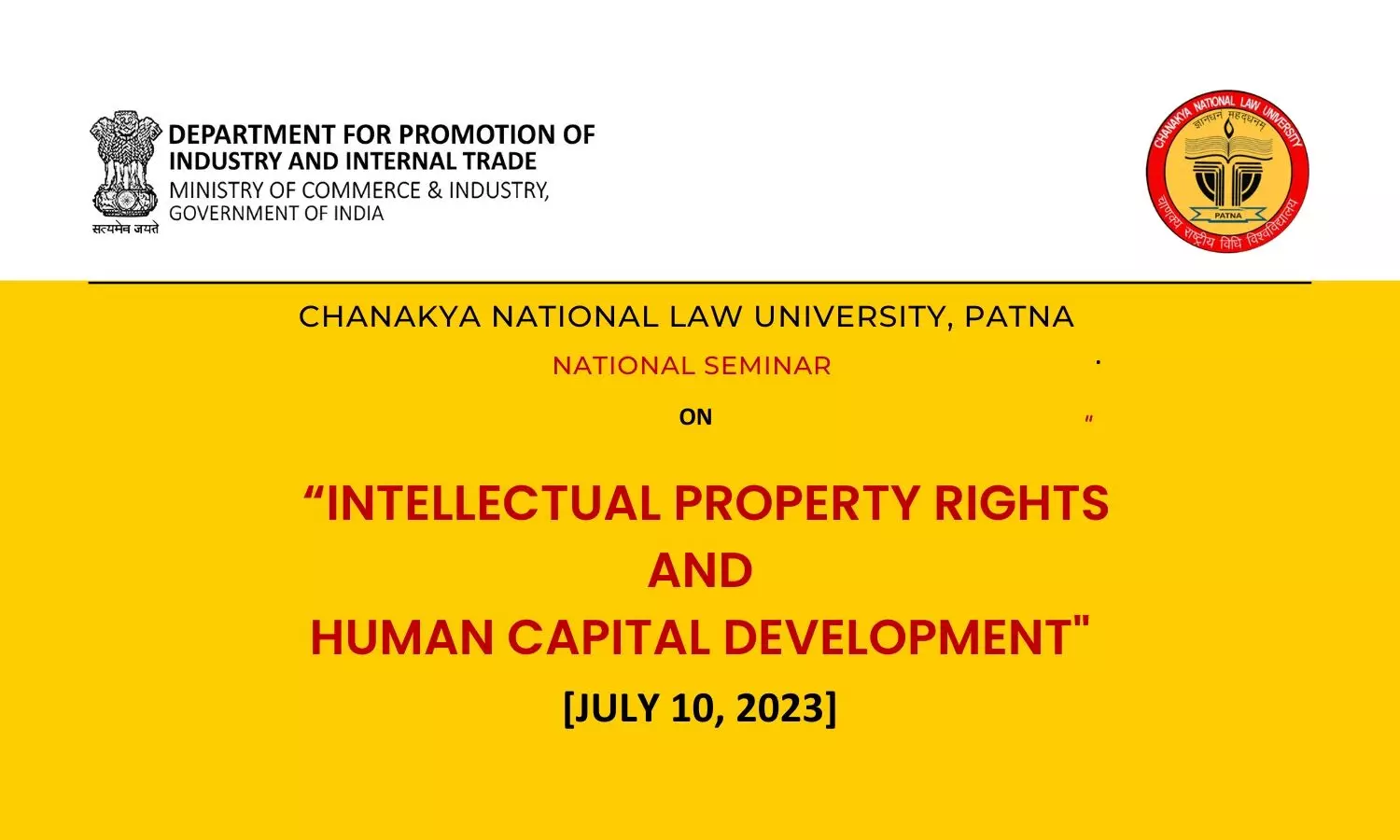CNLU DPIIT IPR Chair National Seminar: Intellectual Property Rights and Human Capital Development
DPIIT-IPR Chair of Chanakya National Law University, Patna is inviting submissions for its National Seminar on “Intellectual Property Rights and Human Capital Development”.

DPIIT-IPR Chair of Chanakya National Law University, Patna is inviting submissions for its National Seminar on “Intellectual Property Rights and Human Capital Development”.
About DPIIT-IPR Chair
The DPIIT IPR-CHAIR has been established at Chanakya National Law University, in 2023, under the SPRIHA scheme of the Department for Promotion of Industry and Internal Trade (DPIIT), Ministry of Commerce and Industry, Government of India. The IPR Chair aims to promote IPR Culture and contribute to IPR research and knowledge. The DPIIT IPR chair at Chanakya National Law University looks forward to collaborating with academics, researchers, and industry to promote the effective utilization of IPRs. Prof. (Dr.) S.C. Roy, Professor of Law, Chanakya National Law University is the DPIIT IPR-Chair Professor at Chanakya National Law University, Patna.
About CNLU, Patna
Chanakya National Law University (CNLU) is a National Law University in Patna, established in 2006 by the Government of Bihar (Bihar Act 24 of 2006) as a public university dedicated to the field of legal education. The Chief Justice of Patna High Court is the ex-officio Chancellor of the university. The CNLU is running five years B.A., LL.B. (Hons.), BBA., LL.B. (Hons.), LL.M., PG Diploma, and Doctoral programs. This is one of the Premier Academic and Research Universities in India.
Concept Note for the Event
Human intellect is the creator of Intellectual Property with the investment of labour skill and judgment, generating rights in the property, known as intellectual property Rights. It’s an exclusive right granted to the creators of their creations. Intellectual Property Rights such as Patents, Copyrights, trademarks, Industrial designs, Geographical Indications, Trade secrets, Layout designs for Integrated Circuits, Traditional Knowledge, Plant Variety and Farmers' Rights, Biotechnology, agriculture, etc. It is a legal concept that refers to creations of the mind for which exclusive rights are recognized. Intellectual property rights incentivize the creator to develop his/her creation and share it with other people for the development of society.
IPRs play a very important role in the development of individuals and society. IPRs protect and encourage the creators for innovation and economic gain. It also leads to healthy competition among creators and users, which ultimately leads to the progress of society. The transfer of technology is important for developmental research. It is helpful in the solution to global challenges in the field of alternate energy resources, new products to consumers, and pharmaceutical development. Agriculture and biotechnology are part and parcel of IPRs. Industries are interwoven with intellectual properties. It is necessary to stimulate economic growth and encourage fair trading, which leads to employment, trade, and commerce for economic and social development. Of course, it requires effective enforcement mechanisms for the protection of their rights.
Sub Themes
- Issues on International conventions: IPR: TRIPS, WTO, WIPO, Paris, Berne, and Madrid conventions
- Legislative framework of IPR in India: Copyright, Patents, Trade secret, Trademark, Design, Layout design, GI, PPVFR, Biological diversity, Genetic Resources (GR), Traditional Cultural Expressions (TCE), IPR Policy, and allied laws.
- Challenges related to Copyright and Cinematography, Performers' Rights, and Music.
- Issues related to Patents in the Pharmaceutical sector, and protection of Medicinal plants.
- Intellectual Property Rights and Competition laws: Interface.
- Commercialization of IPR: Licensing and Technology transfer, Patent pooling,
- Role of IPR for Startups in India: IPR facilitators, encourage women's entrepreneurship, incentives to MSMEs.
- Enforcement machinery in IPR: IPOs, Information and Communication Technology, Office of the Controller General of Patents, Designs, and Trademarks, CIPAM, National Biodiversity Authority (NBA)
- Redressal mechanism in IPR: Tribunals, Special courts, Mediations, ADR
- IPR Litigations
- IPR and Human capital development.
Guidelines For Abstract/ Work in Progress Submission
- All submissions must be made in electronic form in Word format (.doc/.docx) only.
- Authors should write an abstract of 500 words relating to the theme of the seminar.
- The abstract should include a suitable title for the paper, 5 minimum keywords, the name of the author(s), and their affiliation, email and mobile no.
- The abstract should be coherent and free of grammatical errors.
- The full paper shall be published in the IP BULLETINE/E-JAIRIPA (online), a magazine/journal of CNLU.
Guidelines for Paper Submission
- The title of the paper should be followed by Name, Designation, Name of the Organization / University / Institution, and Email address. It is mandatory to mention the Email address, as all future correspondence will be through it;
- Name and details of Co-author, if any;
- Chapter: The chapter should be in Times New Roman 12-point font and double-spaced. Main Title should be in full capitals, bold, and centered 12-point font. Sub-titles should be in sentence case, bold and in 12-point font. Author’s names should be in small capitals and centered 10-point font Footnotes should be in Times New Roman 10-point font;
- Citation Format: Please use footnotes rather than endnotes. Footnotes should conform to The Indian Law Institute, New Delhi Style;
- The originality of Manuscripts: All the contributions should be the original work of the contributors and should not have been submitted for consideration in any other Publication. Any plagiarized work will be out-rightly rejected;
- Copyright: The contributions presented to and accepted for publication and the copyrights therein shall be the DPIIT-IPR Chair, CNLU Patna ;
- The title of the Chapter should be followed by Name, Designation, Name of the Organization / University / Institution, and Email address. It is mandatory to mention the Email address, as all future correspondence will be through it;
- Name and details of Co-author, if any;
- The paper should be typed in MS WORD format (preferably 2007 or 2010);
- The paper must be in a single-column layout with margins justified on both sides;
- The length of the FULL paper should not be below 4,000 words and should not exceed more than 10,000.
Who can participate?
Professionals, Academicians, and Research Scholars in the domain of Law, Social sciences, Science, Engineering, Technology, Pharma and Media disciplines etc.
Certificate
E-certificates will be provided to all the author(s) who will present their papers in the Seminar.
How to Submit
Submissions should be sent via email to: seminar@cnlu.ac.in.
Online Seminar Registration Link
Registration Fees
For Offline
- Academicians/Professionals: Rs. 1000/- (One Thousand only)
- Research Scholars/Students: Rs. 500/- (Five hundred only)
For Online
- Academicians/Professionals: Rs. 800/- (Eight hundred only)
- Research Scholars/Students: Rs. 300/- (Three hundred only)
Important Dates
- Last date for the submission of the abstract/work in progress: July 07, 2023.
- Date of National Seminar: July 10, 2023 (Offline & online)
- Revised Full paper shall be accepted by 15th August 2023 and published in the CNLU online journals after peer review.
Mode of Payment
Account Holder’s Name: DPIIT-IPR CHAIR
Bank: Central Bank of India, Mithapur Bus Stand, Patna
Account Number: 5395772673
IFSC: CBIN0284778
Note: Please share the payment screenshot along with the Abstract.
Contact
Prof. Dr. Subhash C Roy, DPIIT-IPR Chair Professor, CNLU
Ph: +91-766707 4426
Ms. Baishali Jain, Research Assistant, DPIIT IPR Chair, CNLU
Note: Candidates opting for offline paper presentations shall manage their accommodation and travel expenses on their own.
Important Links


